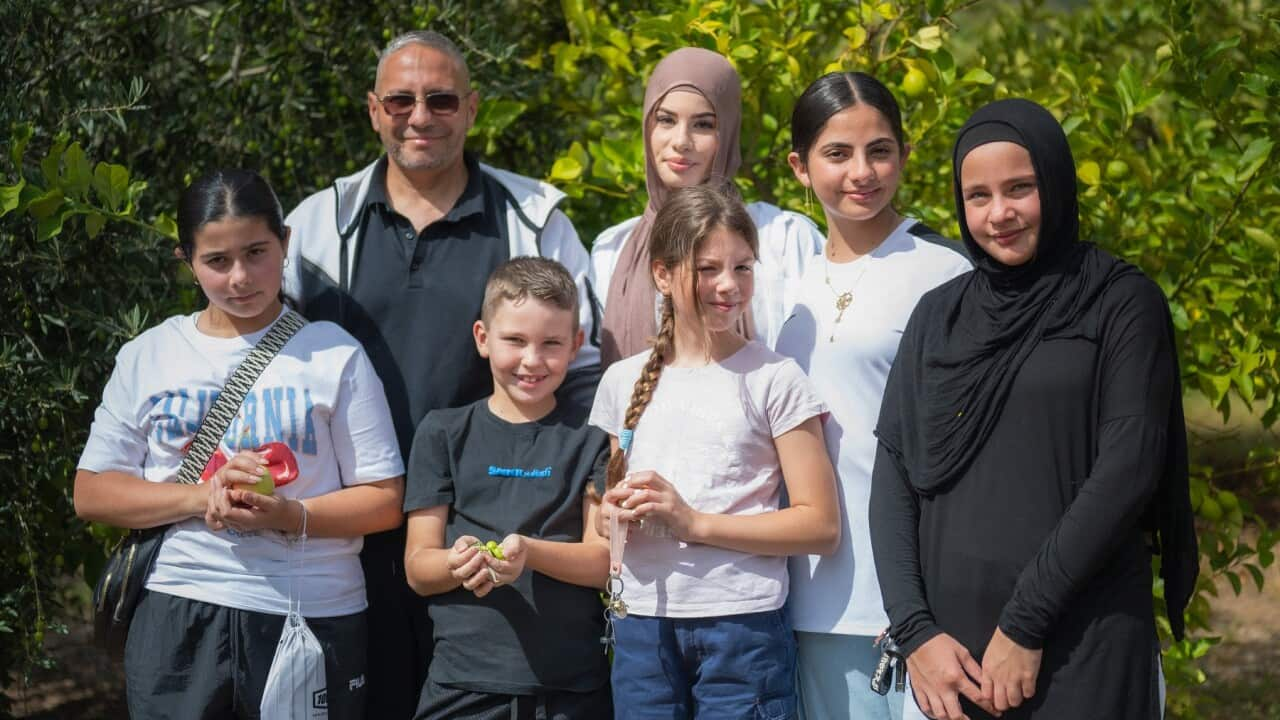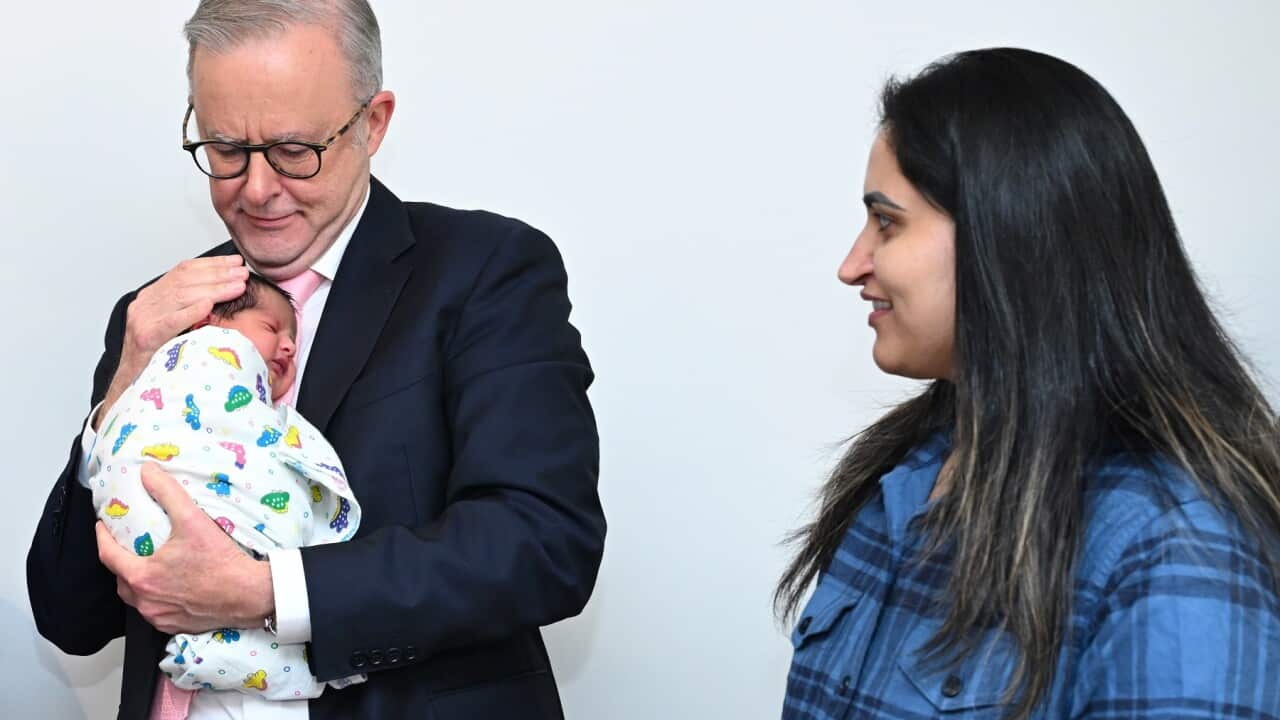TRANSCRIPT
We've heard stories of grief and resilience from a diverse range of people.
Those who have lost loved ones and found their culture a place of comfort, and others who at times have found their culture a difficult space to navigate during their personal grief journey.
We've explored grief beyond the concept of death... and have looked at other life-changing forms of loss.
This includes the loss of identity, career and relationships, as well as the gut-wrenching experience of ecological grief - where individuals and communities feel a deep sense of anticipatory loss and grief for their home and environment.
But we've also heard stories of resilience and community... how people unite in times of loss, and both the new and old rituals people participate in to navigate these often life-changing experiences.
I'm Catriona Stirrat, and this is the eighth and final episode of 'Living Loss'.
In this episode we unpack some of the wisdom we've gained, particularly around supporting each other through grief.
Is there a right and wrong way to support a loved one, friend or colleague? Or does it depend on the individual or the type of grief they may be experiencing?
The answer is complicated.
You might recall Kelly Renee reflecting on the solace her Maori culture provided following her father's death.
“It's a beautiful send-off. And all we're doing really is wanting to send them off onto their next journey, not ever being alone, being around them constantly so that they know they're loved. Maoris we're incredibly spiritual people, so even before we enter the home, we would wash our hands with water and sprinkle it over our heads. And then go and people would come in, and share their stories of how they met my Dad, or the interactions they had with him. To hear so many people share their stories is definitely something you wouldn't get in a Caucasian funeral so to speak.”
But her culture was also a complex space to navigate, as saying goodbye is deeply linked to community in Maori traditions.
“I just remember I think by about day two, I was just so overwhelmed by the constant visitors, the constant people, I mean we're talking 50, 60 people coming in at any point to say... And I just remember feeling a little bit, and I feel silly thinking about it now, 'can you just stop?' Can I just have half an hour with my Dad. I really want to sit with my Dad, by myself just me and Mum, but I can't. But I remember, because it's very much a part of my culture, I remember having difficulty with that; difficulty with sharing my Dad in those last times.”
As Griefline counsellor Marianne Bowdler explains, there isn't one model for how an individual may wish to be supported following the loss of a loved one.
“I would view grief as an attachment trauma. It's in your brain, and it's about pair bonding, and it's how we bond with our babies ,and how babies form a relationship with their siblings, and how we connect with everyone in the world. And that's common to mammals, almost universally we have a sense of panic. Your heartbeat's faster, your breathing s more shallow, you can't sleep, your appetite is decreased. But out of that panic it might lend itself to aggression and physical violence, or it might lend itself to withdrawal and retreat, and I'm just going to get under the blanket and I can't face the day. In terms of our emotional response when that starts to kick in, it's sorrow and anguish and anger, and sometimes release and relief and happiness.”
The grieving period is also not linear.
Ms Bowdler explains how it's actually common that the initial response can feel surreal as people navigate death admin such as funeral arrangements and bookings, before the real pain surfaces.
“So the first thing that we support people with is accepting the reality of the loss. But they have their own time, we take our own time, there's no rush. There is a moment when the penny kind of drops, and what happens then is just an overwhelm of painful emotion. In our sort of predominant western culture we think oh maybe you get two days off at work and then it's like oh well it's 3 months you should probably be fine by now, that happened 3 months ago. This real pain might not happen till 6 months after the death.”
This western allocation of grieving time is something you might recall Sophie Mills also seeks to challenge.
As the founder of Grief Revolution, an organisation that tries to break down taboos surrounding death and grief through counselling services and community workshops, Sophie advocates for healthier conversations around loss.
“It's been a really interesting journey, it was actually after the birth of my second son that I came to the work I do with the Grief Revolution. I started to notice a lot of similarities between birth and death, I noticed that actually the energy in the room when he was born was actually very similar to the energy in the room when my Dad died. you know there both portals in and out of this world. So I'm actually a death doula and grief coach. So a death doula essentially I support families at any stage, essentially from the terminal diagnosis right through to the moment of death, and then the grief coaching happens after the person has died, and I support the family. Although there's a lot of anticipatory grief that happens once a person gets a terminal diagnosis, so I also talk to the dying person about what to expect and how to alleviate some of their fears, and same for the family too - how to support them emotionally.”
Sophie felt a lack of empathy and space around grief in our dominant western culture, following the death of her own Dad, and hopes to normalise conversations around death.
Part of her community-based work for the Grief Revolution is encouraging greater death literacy, even among children.
“Ideally what I'm hoping to do is alleviate anxiety, allow people to flow with the process more. But because we live in such a fear-based culture, it is really challenging to essentially re-train our brains to view death differently. Because you know I think there's so many mothers that don't even say the word death to their children or even many adults say 'my such and such passed away', as opposed to 'my such-and-such died'. When I say to them 'hey, it's actually better for the child when you use concrete language in terms of such and such died', they almost exhale and say 'thank you, I just wasn't sure I don't want to traumatise my child'. And what I tell them is that when you dance around subjects, children are intuitive, they can feel the energy, and if you're uncomfortable, they're going to sense, 'ooh there's something here that's unsafe.'“
Grief Australia's Chief Executive Christopher Hall agrees that a one-size-fits-all template doesn't work well for grief.
He says many people will cope with support from family and friends, while others might experience what is called prolonged or intensified grief.
“There's another group probably about 30% who are, they're hurting, they're struggling to make sense of the loss. They may have very limited social support. So being with other people, identifying with people who are a bit further down the track, sharing the sorts of things that others have found helpful can be really important. And then for those other 10% who I mentioned earlier, we often take a reasonably structured approach. And perhaps over 10 to 16 sessions we would work through a range of things, really identifying what are those things that may have derailed this very normal process of grief. And again that might be feelings they have about a sense of guilty or responsibility. Or it might be about the relationship they had with the person who died.”
This is where many come to rely on their culture or rituals, whether ancient or newly developed, as Mr Hall explains.
“Perhaps I could give an example of one ritual of a young woman whose husband died of Cancer. And she was part of a faith community, and she had decided some time after his death that she wanted to start dating again, and she wanted to take off her wedding ring. But it just didn't feel right that she could do that, even physically to take off. So she had a conversation with her priest about constructing a ritual, and so together they worked out this thing where at the end of a service they invited her and her family to surround her. And the priest who knew them spoke about him and her and their relationship, and then he put to her the wedding vows but in the past tense. And so she answered yes to each of those vows and then he simply asked for the ring. She said it came off as if by magic. And so that was really a ritual of transition - allowing her to move from one space, one identity in a sense, into a new identity.”
Funeral director Joseph Ho is very aware of the different family dynamics that can come into play following the death of a loved one, particularly among the Chinese-Australian communities he works with.
It shows how grief is not only tied to our culture but also how it adapts across different generations.
“It's actually common nowadays that they are actually navigating two worlds because they are handling the way they say goodbye to their parents or the deceased. At the same time they are doing what the deceased traditional are. So the Australian-Asian will go through the norm of choosing the music, doing a slideshow, doing a eulogy, and then they'll leave time for the monk to do the chanting as a final farewell. Whereas the older generation will just focus on the chanting part, the tradition part. But a lot of the time now the grandchildren will step in and say, 'oh they do that, that's how the western does it, I want to do that too'. We accommodate that too. So dealing with the grief in both generation.”
Grief is clearly as personal as it is universal.
For Julia, her Pentecostal Church was a somewhat suffocating space for navigating grief following the loss of her mother.
“I didn't feel like I had a private one on one time with her, it just happened so quickly. I just encountered a lot of strangers at the event. The funeral service especially. You know where its just people, connection from Church, friends. And it just felt like a spectacle, rather than actually a commemoration. It just felt like something people did for the sake of doing it. I think it was shared on Facebook as well. People were sharing photos, comments, it went everywhere. And so we also ha people from overseas, our relatives reaching out. And it felt like all of a sudden, everyone wanted to know what was happening, they were so interested in my Mum's life., whereas when she was alive there was snot much of that. So I would have preferred for it to be more private, fewer people, and less social media presence in a way.”
Julia has had to find her own support mechanisms to grieve in a more personal way.
“I've turned to counseling, I've turned to spirituality, I've turned to self-care, self-help. I've tried different things to be honest, and I still am learning how to handle grief. But at this point I don't sort of have any help from Church to help in that process of grieving, which is really sad, and I think it's a disadvantage when it comes to being in that community. This is something personal, it's something everyone goes through on their own, it's something they have to learn to reflect to. I don;'t think religion gives you an answer for that, it gives you principles. And I think I'm just learning to live by those principles, and believing that you know there's always something better on the other side.”
And of course there are different types of grief beyond the loss of a loved one.
Griefline counsellor Abi Catchlove describes the concept of disenfranchised grief - those losses that aren't typically acknowledged or accepted within society.
In order to offer valuable support for such losses, it's important to give them credibility.
“So the disenfranchised grief is a grief that's not openly or publicly acknowledged. So this could be a loss of a pet or an abortion or a miscarriage or loss of personality or ability due to health conditions. Or the loss of a relationship or friendship breakup. I think grief is pretty overwhelming and confusing in and of itself, so I think it definitely does or can compound that kind of, I guess, people not knowing it's a thing that's absolutely valid, or kind of going in on themselves because they're feeling these things and it doesn't make sense, or it's not spoken about.”
The loss of identity can be a uniquely difficult grief to navigate, because this experience is often minimised.
Hillary spoke about her struggles with identity when she lost her dream job as a classical musician in a small orchestra.
“I think one of the hardest things that for me was a loss of self confidence and you spend a long time, particularly as a musician get In one on one feedback, which is a circular, 'okay, you haven't done this, right, you need to improve'. And so that's great. It's very healthy sort of situation. But to have lost that sense of, okay, I have skills and they're valuable, and they're useful. And they recognised by somebody paying me to not have that makes you feel like, Oh, am I worthy? Am I actually a real artist? Am I a real musician? Or am I just somebody who was pretending for a while?”
Ecological grief is also a disenfranchised grief, because it's not something that is widely recognised.
Rikki Dank is a climate activist and proud Gudanji Wakaja woman from Karaniki and Barkly Tablelands in the Northern Territory's town of Borroloola.
She says First Nations connection to the environment transcends terms like 'ecological', and is emotional as she describes the loss from witnessing fracking on her Country.
“I think for me, the other reason too why we're fighting so hard is because our old people need a place to go back to our children need a place to go back to so when we die, we go back to their country. When we are alive of our children need to go back to country. If we don't have a place, where where are we going? Or where did my old people rest their souls? We won't have a place. Where do my my grandchildren grow up? We don't have a place. We are refugees in our own country, not of our making, but by the making of greed, by people wanting to make money.”
The tools required to navigate this grief is unique for First Nations peoples, but are vital strategies to consider for everyone.
It can involve protesting, and also for Rikki an invitation to non-Indigenous Australians to partake in an immersion in Country, to deepen understanding of the interdependent relationship Indigenous peoples have with the environment.
“We needed them to see how we interacted with country and how our country interacts with us, as well as our non human kin. And that it was important for them to understand or start to learn to understand the relationship that we have with country. And that it's not something that you it's impossible to kind of learn in a week. But you know, we need our country to survive and to be healthy. And then our country needs us. And I thought if we did this, if we taught people this that they then themselves would develop and build a relationship with country. And then you know, when you've got more people loving country learning about country, they're willing to fight for it as well, like we are.”
Griefline Counsellor Abi Catchlove explains how disenfranchised grief often comes from misunderstanding or a lack of ability to empathise with a specific experience or feeling.
“And then it's hard to manage other people's expectations in a context like this, you know, speaking to the sense of disenfranchised grief. But you know, as with a lot of grief, navigating other people's response, and reactions to loss can be really confusing and isolating. Because without having experienced it firsthand, it can be difficult for people to really understand the nuance of this grief, and so that some things look straightforward from the outset. But it's not straightforward at all.
In many ways, Indigenous Australian experiences of grief have long been disenfranchised - as they intersect with intergenerational trauma, such as that suffered by members of the Stolen Generation.
You might recall Uncle Michael, who was removed from his family at just 10 years old, alongside his six siblings.
He says he was subject to horrific sexual, physical and emotional abuse in the institution, and turned to alcohol as a young adult to deal with this trauma.
It wasn't until he discovered the power of collective healing 50 years on from this trauma that Uncle Michael was able to delve into his own grief among the safety of other men.
“We are a community of our own right? And this is what we understand now as we come in, collective healing is that sense is that when we get together we trust each other. And trust is probably the most powerful thing, that is the magical word with us and because where we were, it was very difficult for us to trust anybody because of what happened to us. So when we give our trust it's so precious, but if it gets broken it doesn't go back.”
As a member of the Healing Foundation's Stolen Generations Reference Group, Uncle Michael shares stories of this grief with other men who were subject to the same horrific violations.
He says talking doesn't come easily, but it's vital to break the cycle for future generations.
“The pain never goes away. We wake it up each time when we do these types of talks but I understand above everything else if we don't talk about it, it slowly kills us from the inside. I'm identifying this trauma that is growing just from me, and my concern is now that the next generation are the ones who are going to suffer. Whenever they take children away from families, families become broken, communities become broken. It isn't possible to heal communities, but it is possible to rebuild family structure. Happy families makes happy communities. We tell stories and talk about stuff now that has happened to us in the past - they re the knowledge holders of the future.”
But of course there are coping strategies and ways to navigate these often heavy feelings of loss.
When Abi talks about ways to navigate ecological grief, she acknowledges the pain but also research around more hopeful responses from individuals and communities in approaching environmental loss.
This includes such things as eco-therapies, or turning towards nature for healing, as well as community gardening and environmental activism.
“It doesn't always have to be despairing, I guess. And it really focused on the fact that when there is support, and when that's shared, that it can actually ignite some creative or a creativity to kind of reinvigorate their research like it doesn't. You know, people can kind of assume that grief is all doom and gloom. But I think my understanding of grief is that it can be a medicine for us. And it's it's wanting healing for us. It's not wanting to sabotage us. It's wanting healing.”
Ultimately it's about sharing our stories.
This is a wisdom Yarraka describes as intrinsic to Aboriginal Australian culture, but this sense of community is something all cultures can foster when it comes to navigating grief.
“We give grief a place you know, and we call that sorry, business at ceremony, it's sacred time for family to come together to sit laugh, cry, share memories, but also remember that we have a deep respect and understanding for the afterlife. As my grandma used to say the living belong with the living and the dead belong with the dead.”













